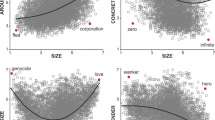Abstract
In this study we examined responses to apparent forced-choice questions in which two choices were presented as options and both were correct. The responses suggested by these questions were in conflict with responses based on simple classificatory logic. The results showed that adults, as well as children, were easily misled by the implication of the questions and there was no consistent evidence for increases in the number of “logical” responses as a function of age. However, when children and adults were initially given set-breaking items designed to sensitize them to the misleading nature of questions, they answered the set-breaking items as well as subsequent test items correctly. The results are consistent with pragmatic theories of language that stress the role of context and intentionality as major determinants of meaning.
Similar content being viewed by others
References
Austin, J. L. (1962).How to do things with words. London: Oxford University Press.
Braine, M., & Rumain, B. (1981). Development of comprehension of “or”: Evidence for a sequence of competencies.Journal of Experimental Child Psychology, 31, 46–70.
Bruner, J. (1984).Narrative and paradigmatic modes of thought. Paper presented at the meetings of the American Psychological Association.
Grice, H. (1975). Logic and conversation. In P. Cole & J. L. Morgan (Eds.),Syntax and semantics (Vol. 3). New York: Academic Press.
Grice, H. P. (1978). Further notes on logic and conversation. In P. Cole (Ed.),Syntax and semantics (Vol. 9):Pragmatics. New York: Academic Press.
Inhelder B., & Piaget, J. (1958).The growth of logical thinking from childhood to adolescence. New York: Basic Books.
Inhelder B., & Piaget, J. (1964).The early growth of logic in the child: Classification and seriation. New York: W. W. Norton.
Kwock, M. S. (1984).The effects of linguistic and psychosocial factors on children's logical performance. Doctoral dissertation, Ohio State University.
Kwock, M. S. & Winer, G. A. (1986). Overcoming leading questions: Effects of psychosocial task variables.Journal of Educational Psychology, 78, 289–293.
Neimark, E. D. (1970). Development of comprehension of logical connectives: Understanding of “or”Psychonomic Science, 21, 217–219.
Neimark, E. D., & Slotnick, N. S. (1970). Development of the understanding of logical connectives.Journal of Educational Psychology, 61, 451–460.
Olson, D. R., & Hildyard, A. (1981). Assent and complicance in children's language. In W. P. Dickson (Ed.),Children's oral communication skills. New York: Academic Press.
Olson, D. R., & Hildyard, A. (1983). Writing and literal meaning. In M. Martlew (Ed.),The psychology of written language: A developmental approach. New York: Wiley.
Searle, J. R. (1969).Speech acts: An essay in the philosophy of language. London: Cambridge University Press.
Searle, J. R. (1975). Indirect speech acts. In P. Cole & J. L. Morgan (Eds.),Syntax and semantics (Vol. 3):Speech acts. New York: Academic Press.
Werner, H. (1948).Comparative psychology of mental development. New York: International Universities Press.
Werner, H., & Kaplan, B. (1963).Symbol formation: An organismic-developmental approach to language and the expression of thought. New York: Wiley.
Winer, G. A. (1980). Class-inclusion reasoning in children: A review of the empirical literature.Child Development, 51, 309–328.
Winer, G. A., Hemphill, J., & Craig, R. (1985).The effect of linguistic constraints in promoting non-conservation responses in children and adults. Unpublished manuscript, Ohio State University.
Author information
Authors and Affiliations
Rights and permissions
About this article
Cite this article
Winer, G.A., Rasnake, L.K. & Smith, D.A. Language versus logic: Responses to misleading classificatory questions. J Psycholinguist Res 16, 311–327 (1987). https://doi.org/10.1007/BF01069285
Accepted:
Issue Date:
DOI: https://doi.org/10.1007/BF01069285




